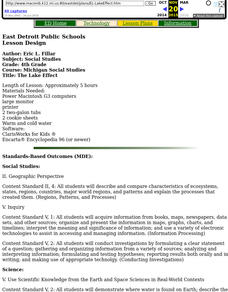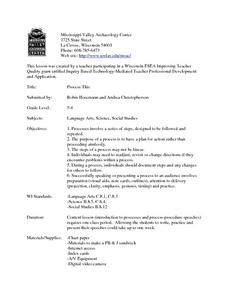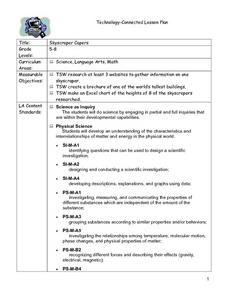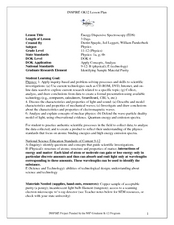Curated OER
Microscopes: Is what you see, what you got?
Eighth graders identify the parts and functions of the microscope. For this biology lesson, 8th graders observe different samples under different types of microscopes. They compare and contrast the details they see.
Curated OER
How Can We Locate Specific Places On Earth?
Second graders discover how to use longitude and latitude to locate specific sites on Earth. They compare old and new ways of locating specific places, and discover how latitude and longitude coordinates are used to locate places on Earth.
Curated OER
The Lake Effect
Fourth graders conduct an experiment demonstrating the effects of water and air temperature on precipitation. They create graphs demonstrating their findings using Claris Works for Kids.
Curated OER
Microarrays: Chipping Away at the Mysteries of Science and Medicine
High schoolers research microarrays on the internet in cooperative groups. Students write an essay describing the use of microarrays in environmental research and in medicine.
Curated OER
Process This
Students chart the steps, including the problem-solving tangent, and discuss the idea of procedures serving to give us a "road map" or guide to help tackle tasks with preparation and forethought.
Curated OER
Ecology and Ecosystem
Students are introduced to the concepts of ecology and ecosystems. In groups, they use the Internet to research one of six topics. They present their information to the class sharing the most interesting information they found. They...
Curated OER
Check Out Lights and Shields with Beads
Students explore Ultraviolet detecting beads and conduct several investigations with them. In this investigative lesson plan students participate in an experiment to see the harmful effects of UV light and discuss their findings.
Curated OER
Animal Adaptations: Focus on Bird Beaks
Sixth graders explore bird beaks as animal adaptation. In this bird adaptation lesson, 6th graders conduct an experiment to determine the connection between the shape of a bird's beak and the food it eats.
Curated OER
Model Mania
Eighth graders study the conservation of matter. For this chemical reaction lesson students examine what happens during a chemical reaction and complete a lab activity.
Curated OER
Do You Hear What I Hear?
Young scholars study hearing and are able to differentiate between different sound waves. In this sound wave lesson students develop a cause and effect model that shows the parts of the ear.
Curated OER
Electric Field Mapping in 3D
Students create a 3D vector field map of an electric field. In this physics lesson, students measure the voltage inside an aquarium with water. They present their findings and map to class..
Curated OER
Aphids and Ladybirds
Students record observations of ladybird beetles and aphids. They develop questions concerning the behavior of ladybird beetles and aphids that are testable by a classroom experimentation. Students develop an investigation.
Curated OER
Skyscraper Capers
Young scholars discuss skyscrapers and listen as the teacher introduces the project. They use the Internet to perform research on one skyscraper. Students use information they gather to create a brochure of their building . They create...
Curated OER
Movement, it's FUN-damental!
High schoolers discover how muscles work. For this biology lesson, students explain the causes of fatigue and muscle soreness. They create graphs and compare results with their classmate.
Curated OER
I Need Room to Breathe
Seventh graders explore how exercise affects carbon dioxide levels in exhaled air.
Curated OER
Energy Dispersive Spectroscopy
Students calculate the values of electron binding energies. In this physics instructional activity, students solve for different wavelength characteristics of X-rays. They present their findings to the class.
Curated OER
2D Kinematics w/ String Racers
Students calculate the speed of string racers. In this physics lesson plan, students measure the time in several trials and get the average. They graph their results using a spreadsheet.
Curated OER
I Have the Solution!
Students explain how to make solutions with specific concentration. In this chemistry lesson, students differentiate acids and bases. They calculate molarity of solutions.
Curated OER
Struggle for Existence and Population Growth in Aphids
Students examine the population of aphids. They identify adaptations they have made for their environment. They make predictions, test their hypothesis and collect information that either proves or disproves their theory.
Curated OER
Teaching Biology Through Problem-based Activities
Students plant seeds and observe the life cycle of the organism. They experimentally research the effects of radiation on seed growth. Students determine the effects of environmental pollutants on harvested seed.
Curated OER
Don’t be a Stoic about Stoichiometry
Students review balancing chemical equations. In this chemistry lesson, students calculate moles of an unknown substance based on stoichiometric relationships in the balanced equation. They cite applications of stoichiometry in the real...
Curated OER
Science: Testing Water for Toxicity
Students investigate the potential toxicity of water samples using California blackworms to test water quality. They observe the worms' behaviors in different water samples and determine which sample has the highest toxicity. At the...
Curated OER
Gwynns Falls
Students investigate the question: What is the impact of urban development and expansion on the health of a decidious forest ecosystem and humans? They examine the issue of land development by responding to a specific scenario and...
Curated OER
Blood Business
Young scholars identify the different kinds of blood. In this biology lesson, students investigate the antigens, agglutinins and Rh factor using their own blood. They use Punnett squares to predict blood type of offspring.

























